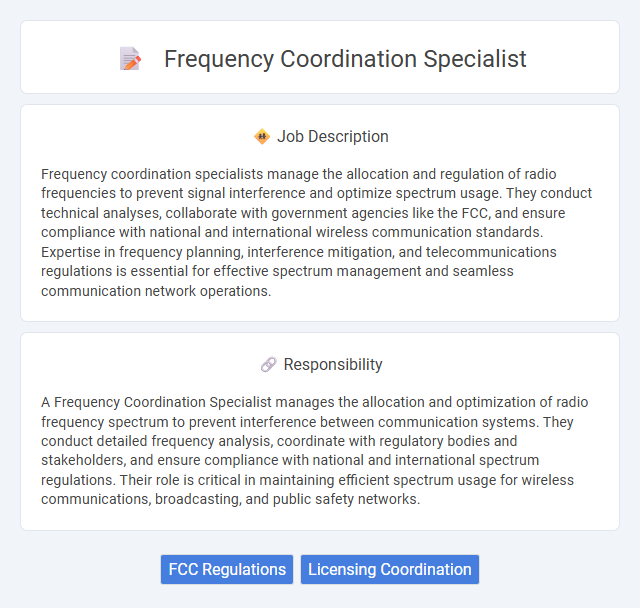
Frequency coordination specialists manage the allocation and regulation of radio frequencies to prevent signal interference and optimize spectrum usage. They conduct technical analyses, collaborate with government agencies like the FCC, and ensure compliance with national and international wireless communication standards. Expertise in frequency planning, interference mitigation, and telecommunications regulations is essential for effective spectrum management and seamless communication network operations.
Individuals with strong analytical skills and attention to detail are likely suitable for a Frequency Coordination Specialist role, as it involves managing complex radio frequency allocations to prevent interference. Those who thrive in collaborative environments and can handle technical data efficiently may find this job fitting. Candidates with limited technical knowledge or difficulty working under regulatory constraints might face challenges in this position.
Qualification
A Frequency Coordination Specialist typically requires a strong background in telecommunications, electrical engineering, or a related technical field, often supported by a bachelor's degree. Expertise in spectrum management, radio frequency (RF) propagation, and regulatory standards such as those from the Federal Communications Commission (FCC) or International Telecommunication Union (ITU) is essential. Proficiency with frequency coordination software and strong analytical skills enable effective resolution of interference issues and optimization of spectrum usage.
Responsibility
A Frequency Coordination Specialist manages the allocation and optimization of radio frequency spectrum to prevent interference between communication systems. They conduct detailed frequency analysis, coordinate with regulatory bodies and stakeholders, and ensure compliance with national and international spectrum regulations. Their role is critical in maintaining efficient spectrum usage for wireless communications, broadcasting, and public safety networks.
Benefit
A Frequency Coordination Specialist likely enhances communication efficiency by minimizing signal interference, which can improve overall network reliability. They probably contribute to regulatory compliance, decreasing the risk of costly fines or service disruptions. Their expertise may also support optimized spectrum usage, potentially leading to cost savings and better resource management.
Challenge
Frequency coordination specialists likely face the challenge of balancing limited spectrum availability with the increasing demand for wireless services. Managing interference risks while ensuring compliance with regulatory standards may often require precise analysis and negotiation skills. There is a probability that these specialists must stay updated on evolving technologies and regulations to effectively coordinate frequencies in complex environments.
Career Advancement
Frequency coordination specialists play a crucial role in managing and optimizing radio spectrum usage to prevent interference between wireless communication systems. Advancing in this career often involves gaining expertise in regulatory frameworks, mastering spectrum analysis tools, and obtaining certifications such as Certified Spectrum Manager (CSM). Progression opportunities include roles like senior frequency coordinator, spectrum manager, or regulatory affairs specialist, where professionals lead complex projects and influence policy development.
Key Terms
FCC Regulations
Frequency coordination specialists ensure compliance with FCC regulations by managing and resolving interference issues in wireless communications. They analyze spectrum allocations under Part 90 and Part 101 of the FCC rules to optimize frequency usage for public safety, commercial, and industrial applications. Proficiency in FCC licensing processes and coordination protocols is essential to maintain interference-free operation and regulatory compliance.
Licensing Coordination
Frequency coordination specialists ensure optimal spectrum usage by managing licensing coordination tasks for wireless communication systems. They analyze regulatory requirements, prepare application submissions, and liaise with government agencies to secure necessary frequency licenses. Expertise in compliance and interference mitigation is critical to maintaining efficient and lawful spectrum operation.
 kuljobs.com
kuljobs.com